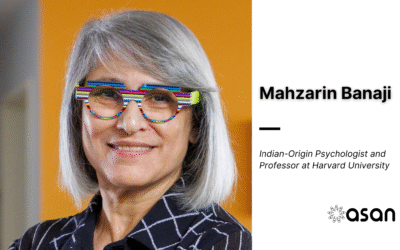Dr. Pooja Khatri, an esteemed Indian-American neurologist and stroke expert, has been appointed as the new Chair of the Department of Neurology at Yale School of Medicine, effective April 1, 2025.
She will also serve as Chief of Neurology at Yale New Haven Hospital and the Yale New Haven Health System. This appointment reflects the remarkable expertise and leadership Dr. Khatri brings to one of the top medical institutions in the world.
A Visionary Leader in Neurology
Dr. Khatri’s appointment marks a significant milestone for the field of neurology, as she will lead Yale’s Department of Neurology in its mission to provide innovative patient care, advance groundbreaking research, and shape the future of medical education for the next generation of neurologists.
In addition to her leadership role within the department, Dr. Khatri will collaborate with Yale’s broader healthcare network to enhance access to state-of-the-art neurological treatments for patients across a wide geographic region.
Her experience spans across various high-impact roles, and her leadership is expected to foster further advancements in the realm of neurological care. Dr. Khatri’s vast experience in clinical stroke, acute neurological care, and stroke intervention aligns perfectly with Yale’s vision of excellence and transformative care in neurology.
Academic and Research Excellence
Before her appointment at Yale, Dr. Khatri served at the University of Cincinnati, where she held a prestigious position as a professor of neurology and rehabilitation medicine, and as vice chair of research within the Department of Neurology and Rehabilitation Medicine.
Additionally, she was the associate director for clinical research at the Stroke Center of Excellence at the UC Gardner Neuroscience Institute.
Throughout her career, Dr. Khatri has earned international recognition for her pioneering work in stroke intervention and her significant contributions to the development of novel clot-retrieval therapies.
Her groundbreaking research in the field of stroke therapy has garnered her a place among the top one percent of Highly Cited Researchers in the world, a distinction awarded by Clarivate Analytics.
Dr. Khatri’s extensive research portfolio includes contributions to stroke therapy, prevention of recurrent strokes, development of radiological biomarkers, and clinical trial design. She played a pivotal role in demonstrating the time-dependent nature of endovascular therapy, which has been crucial in improving outcomes for stroke patients.
Her work on intravenous thrombolysis in mild, nondisabling strokes has influenced clinical guidelines, changing the way healthcare professionals approach these cases.
Currently, her NIH-funded research includes multiple high-profile studies, such as the first platform trial in stroke, a dose-finding trial for a novel clot-dissolving monoclonal antibody, and biomarker validation studies for stroke motor recovery.
Her career is characterized by sustained funding from NIH and industry partners, ensuring that her work continues to have a profound impact on clinical care and therapeutic development.

Mentorship and Global Impact
Beyond her research, Dr. Khatri has made substantial contributions to education and mentorship. She has been recognized with numerous teaching awards, including the UC Provost Faculty-to-Faculty Research Mentoring Award and the MENASO Education Award.
Her role as a mentor extends globally—she recently taught at a stroke summer school attended by a World Health Organization (WHO) delegation, focusing on training physicians from low- and middle-income countries in Asia.
Her commitment to global stroke education is evident in her participation in various international forums and in her leadership roles on several prestigious organizations, such as the Executive Committee of the World Stroke Organization (WSO) and the Stroke Council of the American Heart Association (AHA).
Her leadership extends to the European Stroke Organization’s (ESO) Guidelines Board, where she has influenced international guidelines on stroke care.
Educational Background and Career Trajectory
Dr. Khatri’s educational background is as distinguished as her professional career. She holds a Bachelor of Science in Biological Sciences with honors from Stanford University, followed by a medical degree with honors from the University of Illinois at Chicago.
She completed her neurology residency at the University of Pennsylvania and a vascular neurology fellowship at the University of Cincinnati. Additionally, she earned a Master of Science in Clinical Epidemiology from the Harvard School of Public Health.
Her career trajectory has been marked by a continuous drive to merge clinical excellence with research innovation, and her upcoming role at Yale represents the next chapter in an already exceptional career.
Looking Forward to Transformational Leadership
As Dr. Khatri prepares to step into her new role at Yale, the institution looks forward to her leadership in shaping the future of neurology.
Her experience in stroke, her innovative research, and her global perspective on neurology make her an ideal fit to lead Yale’s Department of Neurology into a new era of clinical excellence, transformative research, and world-class education.
Yale School of Medicine also expressed gratitude to Dr. David Hafler, the outgoing chair, who has led the department with distinction for the past 15 years, ensuring a smooth transition for Dr. Khatri to take the helm.
The transition is also supported by an active and diverse search committee, ensuring that Dr. Khatri’s appointment was made after careful consideration of her qualifications and vision for the future of neurology.
Dr. Khatri’s appointment signals an exciting time for the Department of Neurology at Yale School of Medicine, and the entire medical community eagerly anticipates the contributions she will continue to make to the world of neurology.



